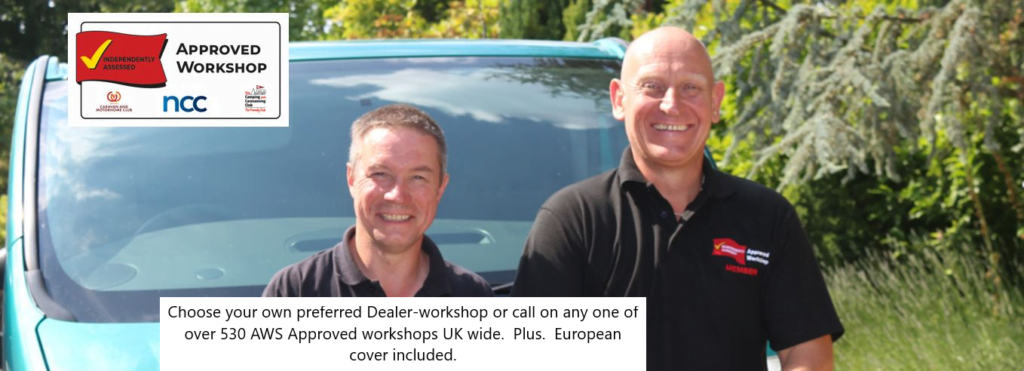Caravan, Camper and Warranty aftercare explained, is a detailed overview of how a leisure vehicle warranty works. ‘The Good, The Bad and the Downright Ugly’ provides you the owner with the difference between an ‘Insurance Policy’ and a ‘Warranty Guarantee’ which is what a manufacturer provides when your vehicle was new.
The Good, The Bad & The downright Ugly in 2023
Following the traumas of Coronavirus across 2020-21 and 2022 the world of travel has changed dramatically and buying a Camper or Motorhome has become far more the first choice for thousands of keen travellers. Cruising has taken a substantial hit as has long haul travel only now re-emerging as a choice. Interest in Campers and Motorhomes on the other hand has grown hugely and with most purchases new and pre-owned comes a ‘Warranty’. The cover and reliability of that ‘Peace of Mind’ can vary massively, that’s why we only work with quality customer service focused dealerships and manufactuers, Engineer Aftercare is the home of Affordable Motorhome Warranty and here we explore what is a warranty, what types of warranty are there and how reliable might they be when the unthinkable happens.
You can find details of all of our partner dealers and manufacturers on our ‘Partners’ pages. Details of Motorhome Warranty, buying and selling your Motorhome or Camper and other leisure vehicle information can also be found at; www.motorhomescampervans.net.
The emphasis when buying a warranty should be understanding ‘What is actually covered’.
So here is some advice from www.engineerinsuranceandaftercare.com the official warranty partner to the Approved Workshop Scheme and CaSSOA on what to look for in a warranty, including:
1: The original manufacturer or Camper conversion company
2: A Dealer one provided with a vehicle you are buying
3: Renewing one after the term has ended
4: Buying your own for a privately purchased Caravan, Camper or Motorhome
Firstly, lets cover some basics on what is a ‘Warranty’. There are 2 general types of warranty; Warranty Insurance policy and Warranty Guarantee, to you the customer, there should little difference to the cost, service or ability to make a claim. The important things are how many stakeholders are in the ‘service chain’ and the quality of the product you are getting.
Below, we have set out The Good, The Bad and The downright Ugly aspects to both types of warranty:
The Good:
- If an ‘Insurance policy’ choose a UK-based FCA-compliant insurer, then you have the comfort of the FCA (Financial Conduct Authority) who monitor how this company works. If they act badly you have someone quite powerful to complain to because they should operate with ‘TCF’ which means Treating Customers Fairly.
- There should be little or no cost difference between an ‘Insurance Policy’ or ‘Warranty Guarantee’, its all in the cover. Engineer Aftercare offers both types, but we chose a Motor Ombudsman Guarantee for fewer links in the sale or approval chain. Also important is how much does our underwriter pay per hourly rate? Dont forget to ask
- Who will make the repair under your warranty? Some of the leading warranty providers and even some manufacturers pay under £50 an hour! This is low and many workshops refuse to take warranty work because of that. That’s why we only use AWS-approved workshops and pay a much higher agreed hourly rate
- The period of cover can be as little as 3 months, 6 months but a quality one will be 1 year, 2 years and even 3 years. A manufacturer one usually starts with 2-3 years Habitation with the Motor section cover being 3 years. On Campers and Motorhomes, water ingress can be 7 to 10 years subject to an annual MUST HAVE habitation report by an AWS approved workshop
- Claim Value can be important, but only as long as it is what it looks like! Claim value can be as low as £250 but £1000 is more common and can be as much as £2000 per claim with unlimited claims (But beware! Some other providers offer a claim limit which looks good, but that’s the whole limit for the whole term)
- Fast claim service, ideally by a simple telephone call. Most quality companies have a modern, fast and call-based or online claim service
- Fair-minded and a company that is less volume-based. Big is not always better as we know, companies handling smaller numbers of suitably maintained and habitation-checked vehicles will have less claims and may be happier to pay yours!
- Can they fix your vehicle fast, even if you are on holiday in a field or on-site? If you have no hot water you want it fixed asap by a mobile workshop
- Engineer Aftercare only uses Approved Workshop Scheme (AWS) approved workshops for the Habitation section and ideally manufacturer-approved ones for the Commercial section too. The manufacturer only allows trained and approved engineers to fix their vehicles, so why wouldn’t you!
- Compare! Compare! Compare Like-for-Like! Make a list of what you would like for your peace of mind, shop around and compare the price and the cover (Compare Like for like cover to make a true comparison)
- was the warranty recommended from a trusted source? Are they the biggest because they have lots of salespeople, or are they better because quality dealer use them and customers recommend them. Do some homework and read content like this, because we have done the homework for you helping to buy more safely..

The Bad:
- Avoid where possible companies based outside of the UK, many insurers in particular may be based in places like Gibralter, Isle of Man, Jersey or other outside of UK regulatory Financial Conduct Authority oversight. These companies are not overseen by the UK FCA watchdog, so it may be harder to get in touch with them, complain to or about them and if they decline to pay something you believe they should. What then? This is not to say those foreign underwriters are bad, just that extra caution should be taken perhaps, as your leisure vehicle is an expensive investment.
- Spurious sales pitches. One company we spoke to offered £2000 claim limit, that sounds great until you find you can only make one claim to that value or that is the TOTAL claim value for that year. So, if you only make a single claim, what happens if you need to claim again for an engine and again for heating.
- Difficult to claim! If you have to download a form just to claim, then post it, await for a decision and then if approved, your money, your holiday will be over before you get anything fixed
- Volume companies who take almost any vehicle. You take great care of your leisure vehicle, you have a Habitation check annually and maybe a service (But what if the warranty company loves volume business, older less well maintained vehicles. That means more claims, more claims to handle and less profit which must be managed, so how comfortable will they be to pay out on your claim? Or will the general position be ‘Don’t pay unless you have to’?
- Just 3 months or a lower claim rate why is that? That may be OK for older vehicles (Over 12 years) but if it’s a late model and valuable, why isn’t it a full 12 months warranty cover or longer? You are likely paying a lot of money for the vehicle so expect some comfort
- Paying more than you need unless getting something extra. Some additional value or service is great but not for basic cover. If it’s just more expensive for the same or less cover, ask why you should buy from them?
- Do they use trained AWS approved repairers or just anyone busy enough to be VAT registered. Or someone who repairs cars and vans but does a few Caravans too? Ensure they only use MCEA or better still AWS approved workshops (The Approved Workshop Scheme is the recognised body of Manufacturer approved workshops UK wide).
The Downright Ugly:
- Some warranty companies have multiple stakeholders in the sales or claim chain making a claim or complaining difficult, lets take an example of an ugly chain in customer service 1: The company that provided the warranty, 2: the company that takes the phone call, 3: The claim handling service, 4: The workshop estimating and completing the repair, 5: The claim adjuster-assessor and finally 6: The underwriter who pays the bills. That’s six people in your claim chain, ideally there should be no more than three. The seller, the workshop and the claim company who manage and pay the bill. That’s why Engineer Aftercare have just three and all of our workshops are fully AWS manufacturer-approved!
- Not having a real person who will listen to your query issue and help to resolve the problem. As the question, if I had a problem to whom can I call and get a decision? If the answer is no one only a call handler or going back to the website, do you really want to trust your Peace of Mind to them?
And finally:
If you would like to Buy or Sell a Caravan, Campervan or Motorhome all of our working partners can be found on our website, and if you have a question about buying and selling or warranty products generally, need advice, find a quality dealer or to buy an Engineer Aftercare Warranty, you can ask to speak to me as Managing Director. This is 2023, so why shouldn’t you be able to speak to a senior manager when you need to?
Martyn Raybould
Managing Director
Engineer Aftercare Ltd



